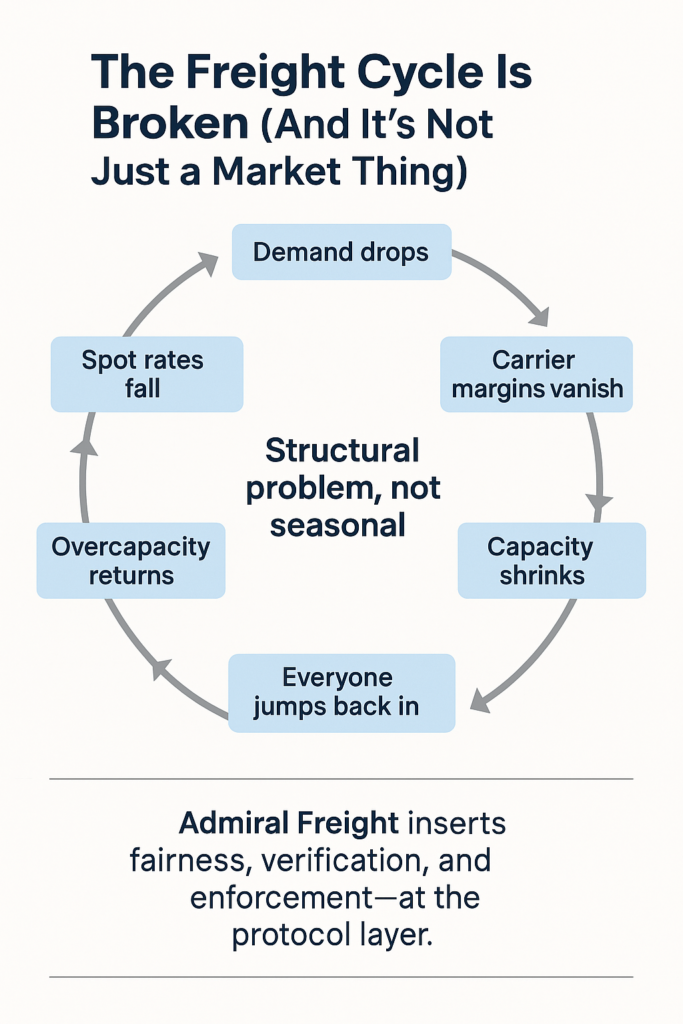What Do Fax and Freight Have in Common?

We at Level5Fleet pride ourselves on being at the forefront of technology. We don’t even own coffee machines because we genuinely believe the Roomba will be serving us espresso soon enough. Yet even we recently fell victim to a structural issue—ironically, in the printing industry.
We needed some physical print materials (yes, shockingly, not everyone’s on Zoom—did we mention we’re victims of structural issues?). Everything was running smoothly until payment time arrived. Our vendor sent us a payment form. By email. That we had to print, sign with a pen, and fax back—exact instructions. Cue frantic office drama: “Who has a fax machine?”. One team member old enough to remember 1997 suggested we trek to a UPS store. And we did.
Funny? Sure. But it highlights a deeper truth: sometimes you can have the best tech in the world, but the system you’re forced to interact with pulls you back into the dark ages.
Small Shippers Have an Outsourcing Problem
Like us fumbling for a fax machine, many small shippers rely on brokers not because it’s perfect, but because it’s easy. Industry research confirms over 70% of freight brokers in North America are small, independent businesses. They’re resource-constrained, tech-light, and often rely heavily on manual processes. In short, they’re doing their best—with what they are stuck with.
This approach worked fine until organized cargo theft and identity fraud became rampant. Recent data shows cargo theft has surged dramatically, costing billions annually. And just like our fax fiasco, these structural vulnerabilities don’t surface until it’s already too late.
Load Boards: Convenience or Liability?
Today’s open load boards feel uncomfortably like emailing a random person to book you a flight on an airline no one’s heard of (you know better than booking Totally Safe AirlinesTM – hopefully). E-tickets, and verified carriers exist. But that’s the level of blind trust still baked into much of the freight process today. According to TIA surveys, nearly 97% of freight brokers depend primarily on these boards. But load boards offer limited verification and zero hardware-enforced security.
Organizations like TAPA provide solutions—but mostly for very high-value shipments. The vast majority of shippers moving loads worth around $100,000 are left unprotected and underserved. Welcome to the missing middle—too small for stringent standards, too big to ignore.
Brokers Are Getting Squeezed—And So Are Carriers
Brokers today face shrinking margins, increasing competition, and growing security demands. Carriers, especially smaller operators, are feeling this crunch even more acutely. Recent industry surveys reveal that more than 50% of small carriers are considering exiting the industry due to declining profits, complicated brokerage arrangements, and mounting overhead.
When carriers leave, capacity shrinks, prices spike, and everyone suffers. It’s a hidden structural crisis – one we perceive as a “market cycle”.
We’re Not in a Cycle. We’re in a Broken System.
Most people think about markets in terms of cycles—ups and downs, booms and busts. But there’s a more useful lens called systems thinking. It looks at how components of a system interact over time, including how delays in feedback and well-meaning reactions often make things worse.
In systems with delayed effects—like freight—people tend to overreact to what’s happening now, instead of what the system actually needs. That’s how you get feedback loops that spin out of control.
In systems thinking, delayed feedback and overreactions often worsen outcomes. The freight market is a perfect example:
- Demand drops → rates crash → carriers exit
- Capacity shrinks → rates rise → carriers flood back in
- Overcapacity returns → rates crash again
It’s a loop. But not a virtuous one.
Each reaction solves a symptom—but leaves the system untouched. It’s like buying a Ferrari just to get to the UPS store faster to send a fax. Wrong problem. Wrong fix.
To truly fix freight, we need to fix the system itself.

Structural Issues Require Structural Solutions
Admiral Freight addresses these foundational issues head-on. Imagine if instead of relying on brokers and hoping for the best, you replace the uncertainty of negotiations with a simple, fair protocol:
- Shippers post the rate they’re willing to pay.
- Carriers post their minimum acceptable rate.
- The platform automatically matches both at the midpoint.
Then, Admiral’s embedded trailer hardware enforces the deal:
- Trailers self-lock and unlock only with authorized identity and timing.
- Drivers are verified cryptographically.
- Compliance is logged and enforced from dock to dock.
No guesswork. No manual enforcement. Just secure, verifiable movement from origin to destination.
Admiral Freight isn’t a broker or a load board—it’s a freight protocol infrastructure. It embeds fairness, security, verification, and automation directly into every shipment — at the hardware level.
The Expedia Moment for Freight
The freight industry stands on the brink of transformation, much like travel once did. Today, relying solely on broker assurances is no longer enough. Admiral Freight offers absolute confidence through automated security.
- Shippers gain certainty, reducing risks and guesswork.
- Carriers improve profitability, with fair midpoint pricing and fewer margin squeezes.
Together, this ensures a secure, profitable freight ecosystem.
It’s Time to Stop Relying on Hope
The traditional freight model is outdated, vulnerable, and ripe for disruption.
Are you ready to stop hoping “Bob” is really “Bob”?
Join Admiral Freight—move your logistics beyond hope and into automated certainty.
Admiral Freight Security you didn’t realize you needed—delivered by hardware, guaranteed by automation.
Stay Connected
Want more insights like this? Follow Level5Fleet for future articles, freight industry trends, and updates on building a smarter, more secure supply chain:
🔗 LinkedIn
🐦 X: @Level5fleet
📘 Facebook
📸 Instagram
The Future of Tractor-Trailer Security